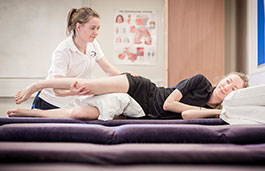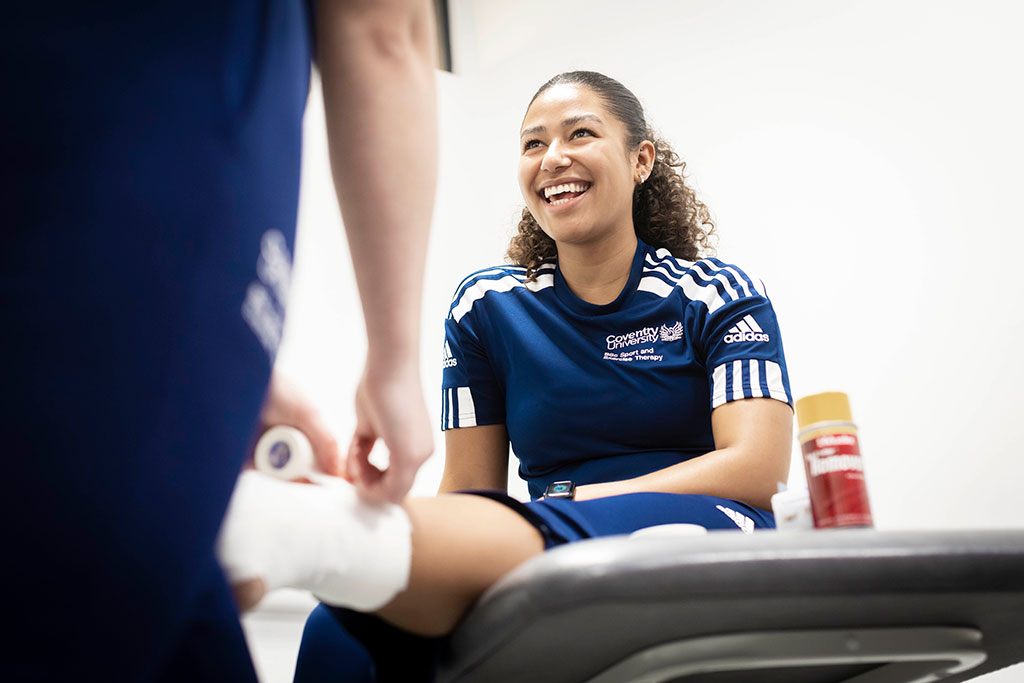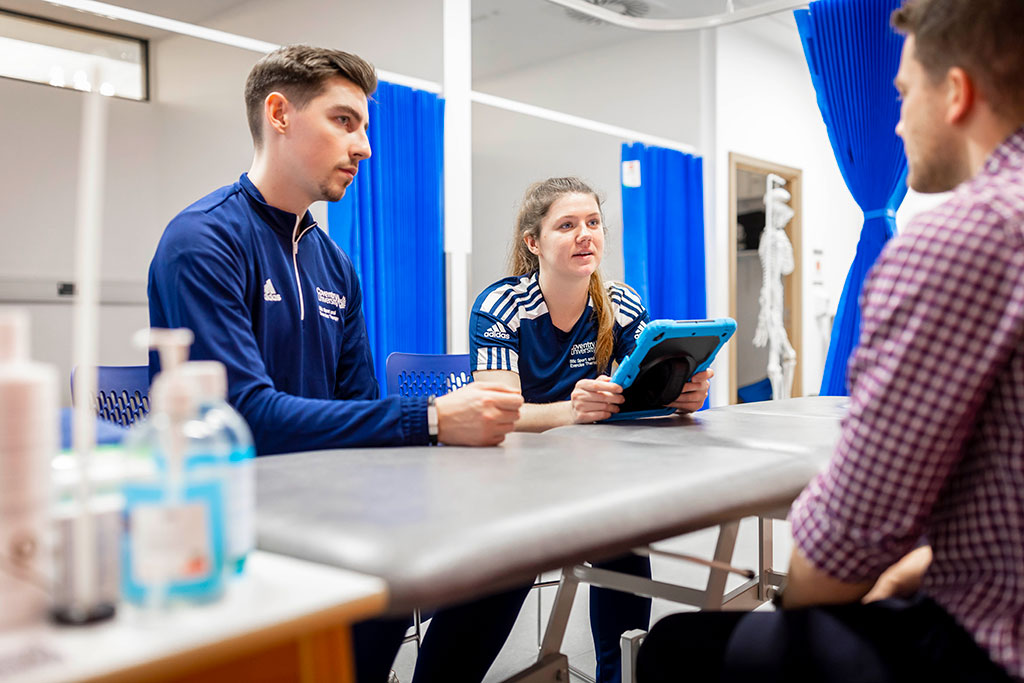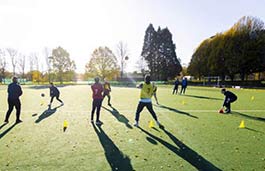Search
Sports and Exercise Therapy BSc (Hons)
Study level: Undergraduate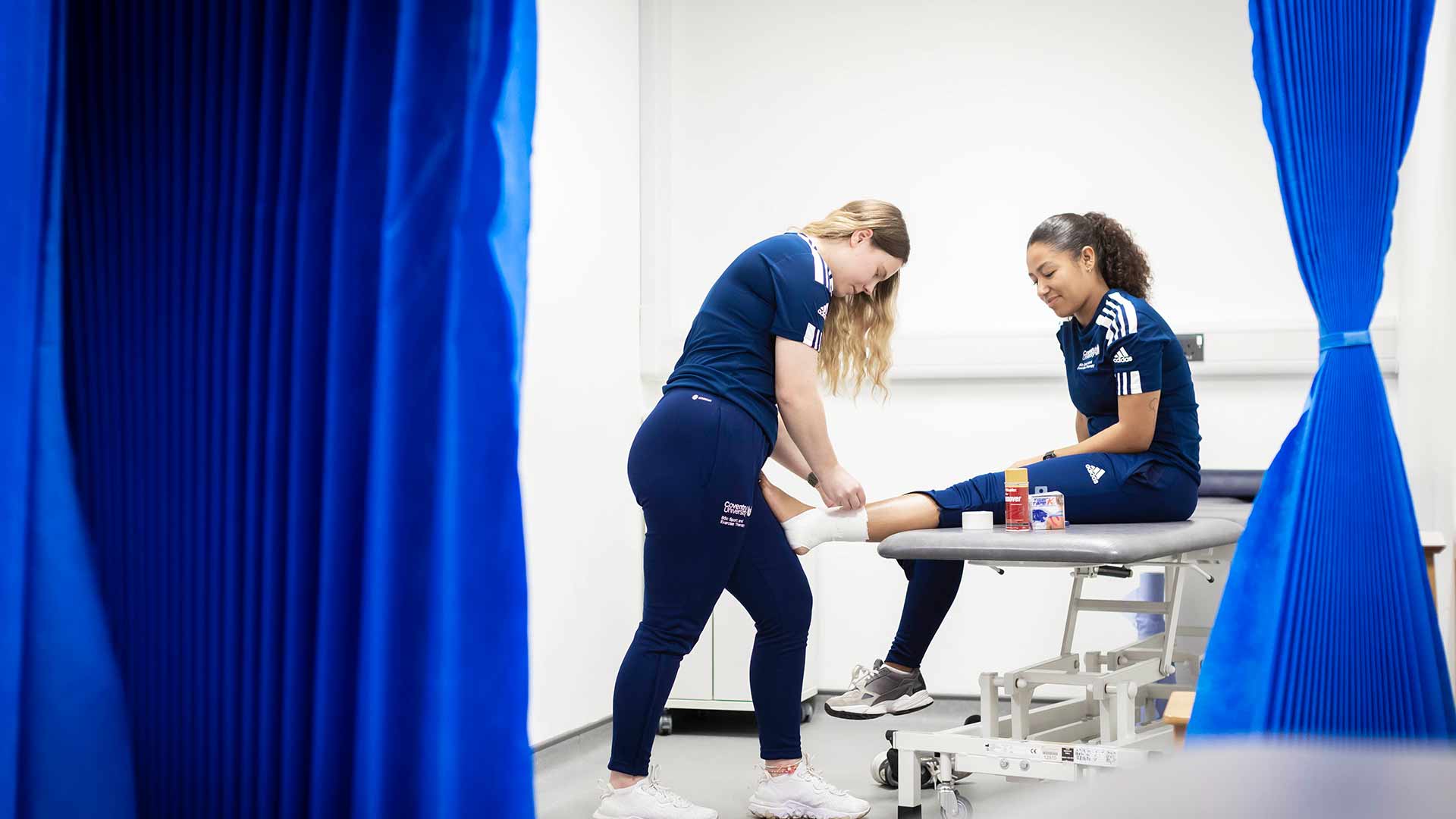
On our Society of Sports Therapists accredited course, we aim to create independent practitioners grounded in musculoskeletal, exercise physiology, treatment, and rehabilitation knowledge with an emphasis on performance underpinned by sports science principles.
Course option
Year of entry
Location
Coventry University (Coventry)
Study mode
Full-time
Sandwich
Duration
3 years full-time
4 years sandwich
UCAS codes
BC96
Start date
September 2025
The information on this page is for 2024-25 entry and should be used as guidance for 2025-26 entry. Please keep checking back on this course page to see our latest updates.
Course overview
The design of our accredited course develops you into an independent practitioner set for the healthcare, sporting, and practice-based environments.
You will learn how to manage a range of clients from the young to the elderly, from the sedentary, to the elite independent and team-based sporting populations.
- You will be guided and supported in your studies by expert academic practitioners who continue to work clinically within the discipline, alongside active research involvement. This ensures you will have access to a wide range of professional networks and links throughout the industry.
- You will benefit from outstanding facilities and the opportunities to work at local, national and international events with elite and community-based sports people (subject to availability).
- On graduation, you will be 'practice ready' and able to start your career as a Sports and Exercise Therapist working in sporting, healthcare or community settings.
Joint Top Modern University for Career Prospects
Guardian University Guide 2021 and 20225 QS Stars for Teaching and Facilities
QS Stars University RatingsTop 5 UK Student City (Coventry)
QS Best Student Cities Index 2023Why you should study this course
- You will get the opportunity to study in the multi-million-pound Alison Gingell building with specialist sports therapy suite, physiology and biomechanics laboratories and industry-standard equipment4.
- You will explore the structure and function of the human body and how to employ a variety of therapy techniques including massage, soft tissue manipulation and exercise programmes. This will be expanded to include joint mobilisation techniques and management of acute emergency situations. In addition, you will have the opportunity to acquire knowledge and skills in the application of scientific disciplines such as psychology and nutrition to your clients.
- Your dedicated lecturers continue to work with international, national and local athletes as well as within successful private practices, and look to support and develop you into the next generation of Sports and Exercise Therapists (staff subject to change).
- Our students have provided support at the World and British Transplant Games and have worked with a variety of elite sports teams including Wasps RFC, Coventry City Football Club, and Coventry Blaze Ice Hockey Team.
Accreditation and professional recognition
The degree is accredited1 and recognised by the following bodies:
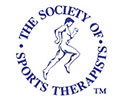
The Society of Sports Therapists
On successful completion, you should be eligible for full membership of The Society of Sports Therapists (SST) (additional costs and SST requirements apply) allowing you to be able to practice as a Sports Therapist in a wide variety of settings.
Coventry University welcomes Birmingham City Women FC
The squad of 24 players visited the university’s Alison Gingell building for midseason strength testing.
Find out more
The practical elements of the course are really helpful – how hands-on the course is. The amount of contact hours and support here is really good.
Matt Searles, Sport and Exercise Therapy BSc (Hons) graduate, 2021
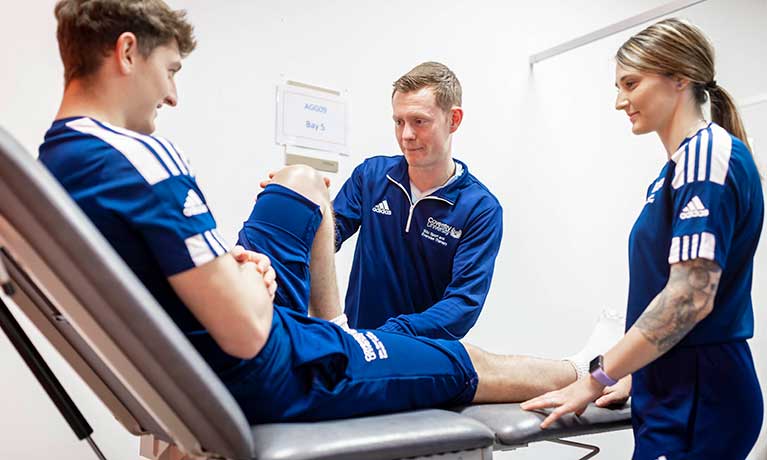
What you'll study
We regularly review our course content, to make it relevant and current for the benefit of our students. For these reasons, course modules may be updated.
We have lots of practical sessions, a lovely sports injury clinic and my lecturers not only help in the teaching setting but also with my own injuries.
Urszula Dabrowska, Sports and Exercise Therapy BSc (Hons) current student, 2021
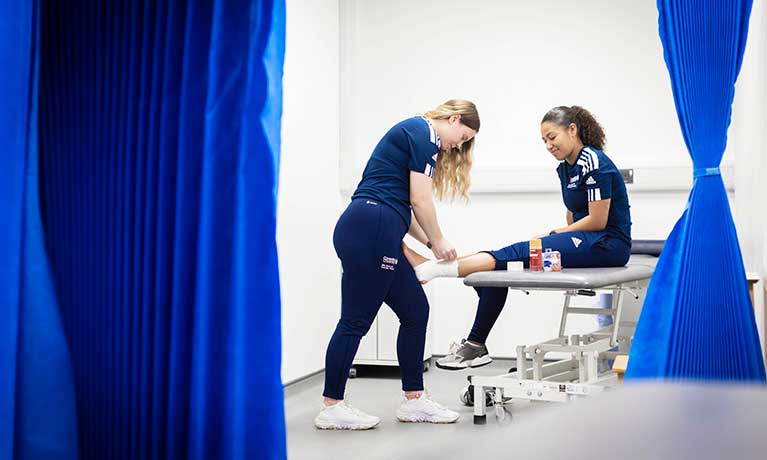
How you'll learn
To guide you through your learning journey your lecturers will utilise a range of teaching and learning techniques to enhance your path to becoming an independent practitioner.
In the first year where you ground yourself in subject theory, interactive lead lectures enable you to participate in the learning journey supported by asynchronous tasks enabling you to undertake further learning in your own time. As our course is practical in nature, we introduce practical sessions from day one combining demonstration techniques and content focused tasks. Through these practical sessions, you develop your soft skills that enhance your information gathering ability, and apply your treatment techniques working individually through working in pairs and as part of a group of students.
Through the massage clinic and sports therapy clinic your educators adopt a more learner-centred approach to your teaching that encourages participative methods including discussions and case studies where peer to peer learning and problem solving is undertaken.
Sports therapists need to be able to see and assess the patient's body in order to provide effective treatment. Therefore, in order to study sports therapy, you may need to remove some clothing in some cases (i.e., when acting as the client). However, it is important to note that modesty and privacy are prioritised throughout using towels as screens and covers.
Teaching contact hours
The number of full-time contact hours may vary from semester to semester, however, on average, it is likely to be around 15 contact hours per week in the first and second year dropping to around 12 contact hours per week in the third and final year as you become a more independent learner.
Additionally, you will be expected to undertake significant self-directed study of approximately 20 hours each week, depending on the demands of individual modules.
The contact hours may be made up of a combination of face-to-face teaching, individual and group tutorials, and online classes and tutorials.
As an innovative and enterprising institution, the university may seek to utilise emerging technologies within the student experience. For all courses (whether on-campus, blended, or distance learning), the university may deliver certain contact hours and assessments via online technologies and methods.
Since COVID-19, we have delivered our courses in a variety of forms, in line with public authority guidance, decisions, or orders and we will continue to adapt our delivery as appropriate. Whether on campus or online, our key priority is staff and student safety.
Assessment
This course will be assessed using a variety of methods which will vary depending upon the module.
Assessment methods include:
- Formal examinations
- Essays
- Group work
- Presentations
- Reports
- Projects
- Coursework
- Individual assignments
The Coventry University Group assessment strategy ensures that our courses are fairly assessed and allows us to monitor student progression towards achieving the intended learning outcomes.
International experience opportunities
Our sandwich degree option allows a full-year work placement, which can be taken abroad, or you can undertake a study-year abroad2. Past students in our School have been successful in securing places in Spain, France, Canada and the US. The Society of Sports Therapists (SST) also runs a travelling scholarship scheme for student members, which enables successful applicants to work abroad in various clinics or educational establishments. (Subject to additional costs. For further requirements and eligibility please visit the SST website.)
We also try to ensure there is an international perspective to course content and have previously visited the World Transplant Games in Argentina and participated in collaborative online international learning (COIL) projects with places such as Hong Kong.
You can go straight from uni and be successful in work. It is a competitive environment but if you work hard, are dedicated and passionate, it can be done.
Matt Searles, Sport and Exercise Therapy BSc (Hons) graduate, 2021
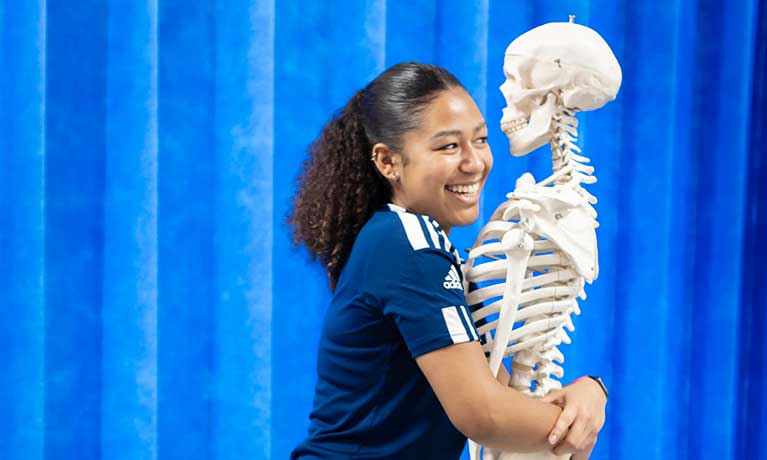
Entry requirements
Typical offer for 2024/25 entry.
Not got the required grades? We offer this degree with an integrated foundation year.
Fees and funding
| Student | Full-time | Part-time |
|---|---|---|
| UK, Ireland*, Channel Islands or Isle of Man | 2025/26 fees TBC 2024/25 fees - £9,250 per year |
Not available |
| EU | 2025/26 fees TBC 2024/25 fees - £9,250 per year with EU Support Bursary** 2025/26 fees TBC 2024/25 fees - £18,300 per year without EU Support Bursary** |
Not available |
| International | 2025/26 fees TBC 2024/25 fees - £18,300 per year |
Not available |
If you choose to study this course with a professional placement2 or study abroad year, you will need to pay a tuition fee3 of £1,250 to cover your academic support throughout your placement year.
For advice and guidance on tuition fees and student loans visit our Undergraduate Finance page and see the university’s Tuition Fee and Refund Terms and Conditions.
The university will charge the tuition fees that are stated in the above table for the first Academic Year of study. The university will review tuition fees each year. For UK (home) students, if Parliament permits an increase in tuition fees, the university may increase fees for each subsequent year of study in line with any such changes. Note that any increase is expected to be in line with inflation.
For international students, we may increase fees each year, but such increases will be no more than 5% above inflation. If you defer your course start date or have to extend your studies beyond the normal duration of the course (e.g. to repeat a year or resit examinations) the university reserves the right to charge you fees at a higher rate and/or in accordance with any legislative changes during the additional period of study.
We offer a range of International scholarships to students all over the world. For more information, visit our International Scholarships page.
Tuition fees cover the cost of your teaching, assessments, facilities and support services. There may be additional costs not covered by this fee such as accommodation and living costs, recommended reading books, stationery, printing and re-assessments should you need them.
The following are additional costs not included in the tuition fees:
- Any optional overseas field trips or visits: £400+ per trip.
- Any costs associated with securing, attending or completing a placement (whether in the UK or abroad).
Find out what's included in your tuition costs.
*Irish student fees
The rights of Irish residents to study in the UK are preserved under the Common Travel Area arrangement. If you are an Irish student and meet the residency criteria, you can study in England, pay the same level of tuition fees as English students and utilise the Tuition Fee Loan.
**EU Support Bursary
Following the UK's exit from the European Union, we are offering financial support to all eligible EU students who wish to study an undergraduate or a postgraduate degree with us full-time. This bursary will be used to offset the cost of your tuition fees to bring them in line with that of UK students. Students studying a degree with a foundation year with us are not eligible for the bursary.
Facilities
This course is delivered at Coventry University main campus, primarily in the Alison Gingell building4.
You will benefit from the outstanding facilities for sport and exercise sciences in the purpose-built Alison Gingell building, including sports and exercise therapy clinic, extensive sport and exercise science laboratories, gait analysis track and 3D motion capture software.
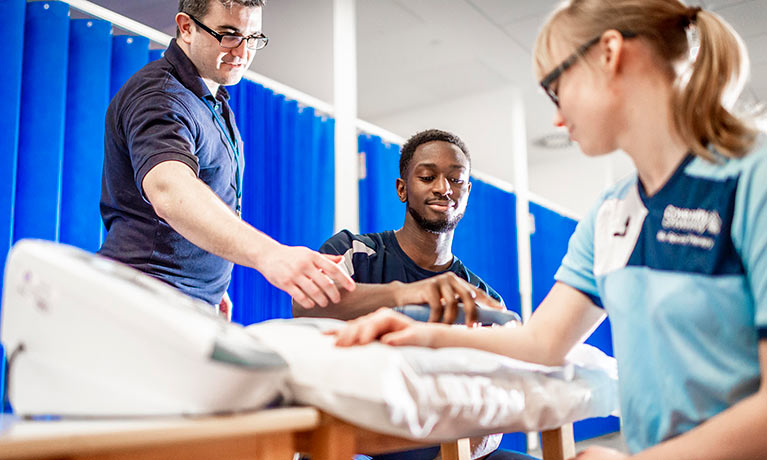
Sports Therapy Clinic
The Sports Therapy Clinic is run by final year Sports Therapy students under the supervision of qualified staff with second year students providing a supervised massage clinic twice a week.
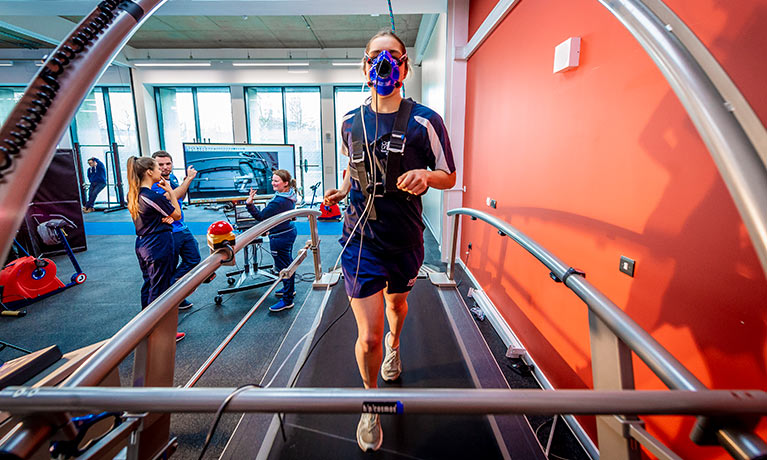
Strength and Conditioning Suite
Our multi-purpose suite is equipped with multiple Olympic lifting platforms, a 20m gait analysis track, an anti-gravity treadmill and a 3D motion capture system.
Careers and opportunities
Accreditation from the Society of Sports Therapists means that on graduation you will be qualified to work as a sports therapist with professional teams, clubs or private clinics. Alternatively, you can access appropriate additional training to support professional football and rugby (additional costs, competitive application, availability and meeting any applicable visa requirements may apply).
The course includes a substantial amount of sport science, which can allow you the opportunity to move into other career options upon graduation, such as management or service delivery in sport and leisure centres. If you are more interested in the medical and health applications of exercise science, you could go on to work within cardiac and other rehabilitation teams within the NHS, or with local councils within sports development or exercise for health schemes.
Past graduates from this course have gone on to work at high levels of professional and semi-professional sports such as football, rugby and transplant sport. Other graduates have gone on to lead successful careers within private practice, both owning and working within a range of therapy clinics nationwide and internationally.
A proportion of past graduates have also utilised their skills within the NHS in rehabilitation departments.
Graduates have also continued with postgraduate study on courses, including our:
Where our graduates work
Graduates have also gone to work as clinicians with practices such as Swan Physio Ltd, Body Logic Health, and as sports therapists for teams such as Wasps, Watford FC and Aston Villa FC, Nottingham Forest FC, Kidderminster FC, Peterborough United FC, Coventry United Ladies FC, QPR FC.
Further study
We have a range of postgraduate courses that graduates would be well prepared to progress onto, enabling them to gain specialist skills relating to development of teaching, sporting potential or lifelong physical activity. Our PGCE courses allow entry to teaching careers and our more specialist MSc programmes in sport provide opportunities for graduates to develop skills in a more specific area of study.
You may be entitled to an alumni discount on your fees if you decide to extend your time with us by progressing from undergraduate to postgraduate study.
The opportunities which were offered to us throughout the course were amazing. We had the opportunity to work in two onsite clinics throughout the second and third year, to cover pitch side first aid at different sporting events, the chance to volunteer at the Coventry Marathon, international trips and a choice to do a placement year in which I managed to get a year-long internship at WASPS RFC. Having these opportunities at Coventry University gave me the chance to develop further and gave me the confidence to become the best Sports Therapist I could be.
Poppy Headland, Sports and Exercise Therapy BSc (Hons) graduate, 2021
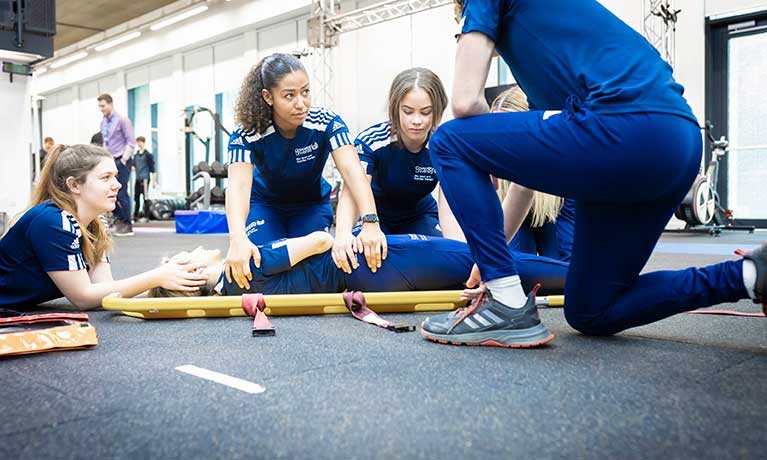
Graduate Immigration Route visa
Based on current information from the UK Government, international students whose study extends beyond summer 2021 may be eligible for a visa under the UK Government’s Graduate Immigration Route, which will enable students to stay and work, or look for work, in the UK at any skill level for up to two (2) years. Check the most up to date guidance available to check your eligibility and any updates from the UK Government before making an application or enrolment decision.
How to apply
You may also like
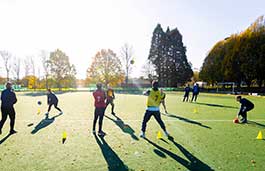
Sports Coaching BSc (Hons)
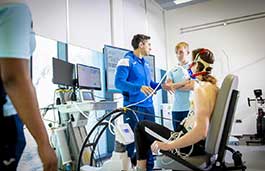
Sport and Exercise Science BSc (Hons)
